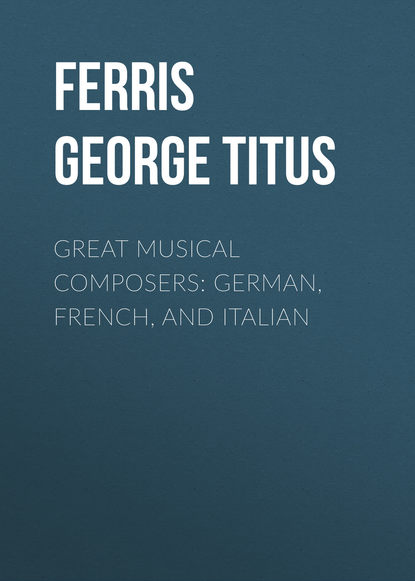По всем вопросам обращайтесь на: info@litportal.ru
(©) 2003-2024.
✖
Great Musical Composers: German, French, and Italian
Настройки чтения
Размер шрифта
Высота строк
Поля
See article on Gluck (#pgepubid00017) in “Great German Composers.”
6
I fear the Greeks, though offering gifts.
7
The same music was set to a poem founded on the first crusade, all the most effective situations being dramatically utilised for the Christian legend.
8
His first English appearance in public was at the King’s Theatre, on the 24th of January 1824, when he conducted his own opera, “Zelmira.”
9
Mr. Chorley probably means “second-rate” as compared with the few very great names, which can be easily counted on the fingers.
10
Admirers of the author of “Don Pasquale” and “Lucia” may be interested in knowing that Donizetti was of Scotch descent. His grandfather was a native of Perthshire, named Izett. The young Scot was beguiled by the fascinating tongue of a recruiting-sergeant into his Britannic majesty’s service, and was taken prisoner by General La Hoche during the latter’s invasion of Ireland. Already tired of a private’s life, he accepted the situation, and was induced to become the French general’s private secretary. Subsequently he drifted to Italy, and married an Italian lady of some rank, denationalising his own name into Donizetti. The Scottish predilections of our composer show themselves in the music of “Don Pasquale,” noticeably in “Com’ e gentil;” and the score of “Lucia” is strongly flavoured by Scottish sympathy and minstrelsy.
11
Victor Hugo did the same thing with Verdi’s “Ernani,” and other French authors followed with legal actions. The matter was finally arranged on condition of an indemnity being paid to the original French dramatists. The principle involved had been established nearly two centuries before. In a privilege granted to St. Amant in 1653 for the publication of his “Moïse Sauvé,” it was forbidden to extract from that epic materials for a play or poem. The descendants of Beaumarchais fought for the same concession, and not very long ago it was decided that the translators and arrangers of “Le Nozze di Figaro” for the Théâtre Lyrique must share their receipts with the living representatives of the author of “Le Mariage de Figaro.”
12
Bellini was born in 1802, nine years after his contemporary and rival, Donizetti, and died in 1835, thirteen years before.
13
Here Marsyas flayed Apollo.
14
In its infancy Italian comic opera formed the intermezzo between the acts of a serious opera, and – similar to the Greek sylvan drama which followed the tragic trilogy – was frequently a parody on the piece which preceded it; though more frequently still (as in Pergolesi’s “Serva Padrona”) it was not a satire on any particular subject, but designed to heighten the ideal artistic effect of the serious opera by broad comedy. Having acquired a complete form on the boards of the small theatres, it was transferred to the larger stage. Though it lacked the external splendour and consummate vocalisation of the elder sister, its simpler forms endowed it with a more characteristic rendering of actual life.
15
See article on “Gluck (#pgepubid00017),” in The Great German Composers (the first part of this work), in which his connection with French music is discussed.
16
In German known as “Die Wasserträger,” in English, “The Water-Carriers.”
17
It is a little singular that some of the most distinguished names in the annals of French music were foreigners. Thus Gluck was a German, as also was Meyerbeer, while Cherubini and Spontini were Italians.
18
Yet Lord Mount-Edgcumbe is inconsistent enough to be an ardent admirer of Mozart’s “Zauberflöte.”
19
It has been a matter of frequent comment by the ablest musical critics that many noble operas, now never heard, would have retained their place in the repertoires of modern dramatic music, had it not been for the utter rubbish to which the music has been set.





